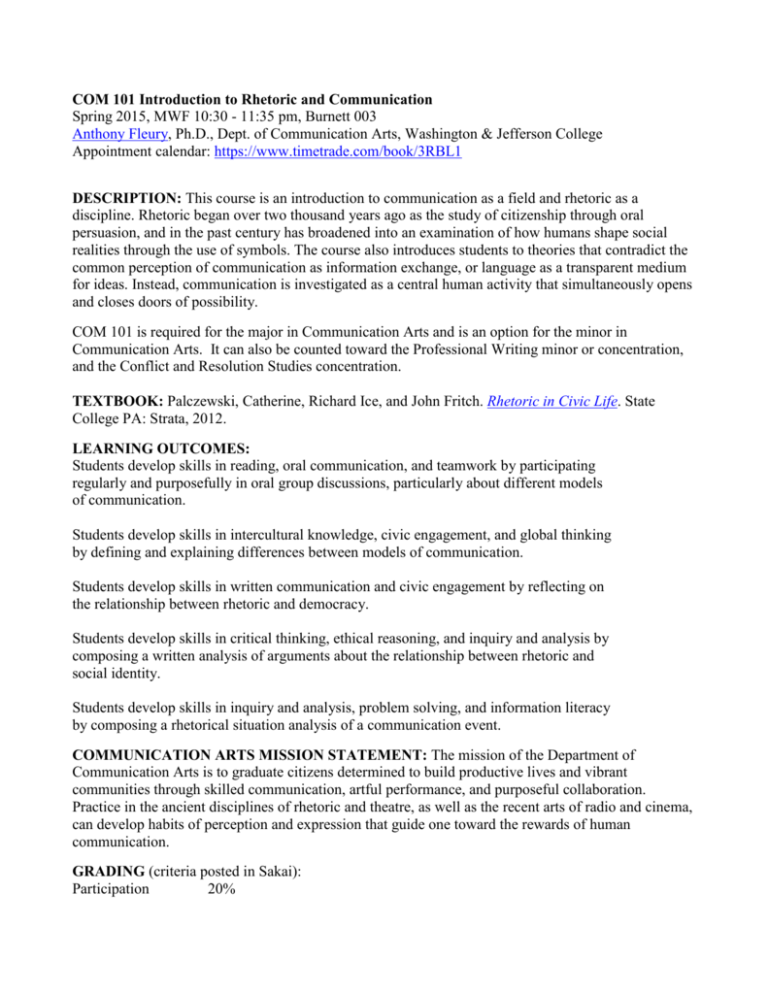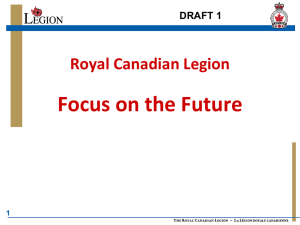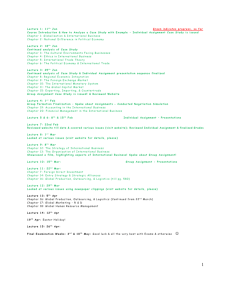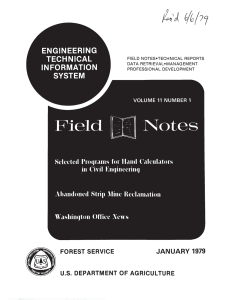COM 101 Introduction to Rhetoric and Communication
advertisement

COM 101 Introduction to Rhetoric and Communication Spring 2015, MWF 10:30 - 11:35 pm, Burnett 003 Anthony Fleury, Ph.D., Dept. of Communication Arts, Washington & Jefferson College Appointment calendar: https://www.timetrade.com/book/3RBL1 DESCRIPTION: This course is an introduction to communication as a field and rhetoric as a discipline. Rhetoric began over two thousand years ago as the study of citizenship through oral persuasion, and in the past century has broadened into an examination of how humans shape social realities through the use of symbols. The course also introduces students to theories that contradict the common perception of communication as information exchange, or language as a transparent medium for ideas. Instead, communication is investigated as a central human activity that simultaneously opens and closes doors of possibility. COM 101 is required for the major in Communication Arts and is an option for the minor in Communication Arts. It can also be counted toward the Professional Writing minor or concentration, and the Conflict and Resolution Studies concentration. TEXTBOOK: Palczewski, Catherine, Richard Ice, and John Fritch. Rhetoric in Civic Life. State College PA: Strata, 2012. LEARNING OUTCOMES: Students develop skills in reading, oral communication, and teamwork by participating regularly and purposefully in oral group discussions, particularly about different models of communication. Students develop skills in intercultural knowledge, civic engagement, and global thinking by defining and explaining differences between models of communication. Students develop skills in written communication and civic engagement by reflecting on the relationship between rhetoric and democracy. Students develop skills in critical thinking, ethical reasoning, and inquiry and analysis by composing a written analysis of arguments about the relationship between rhetoric and social identity. Students develop skills in inquiry and analysis, problem solving, and information literacy by composing a rhetorical situation analysis of a communication event. COMMUNICATION ARTS MISSION STATEMENT: The mission of the Department of Communication Arts is to graduate citizens determined to build productive lives and vibrant communities through skilled communication, artful performance, and purposeful collaboration. Practice in the ancient disciplines of rhetoric and theatre, as well as the recent arts of radio and cinema, can develop habits of perception and expression that guide one toward the rewards of human communication. GRADING (criteria posted in Sakai): Participation 20% 2 Presentation DPMA Paper Midterm Exam Final Exam 20% 10% 20% 30% After selected class meetings featuring discussion, and after selected written discussions conducted on Sakai (if any), selected students receive a score for that session, based on criteria listed below. Your end-of-term class discussion grade will be determined based on the average of these scores. 7 You are well prepared for class and it shows. You make numerous attempts to contribute. You ask questions directly of other participants beyond answering instructor questions. Your contributions demonstrate careful, complex reflection on the materials and topics for study. You actively listen and encourage others in their participation through positive nonverbal feedback. 6 You show evidence of being prepared. You make several attempts to contribute comments or questions. You actively listen and encourage others in their participation through positive nonverbal feedback. 5 You show some evidence of preparation. You participate when called upon. You appear to actively listen and are supportive of other participants in the discussion. 4 or 3 You show little evidence of preparation. You are unable to respond to questions or do so with difficulty. You do not appear to be an active listener. You do not appear to support other participants through positive nonverbal behaviors. 2 to 0 You do not appear to actively listen. Your verbal and/or nonverbal feedback to others is blank, aggressive, or disrespectful. 0 You are absent. POLICIES: Verifiable disabilities that affect course performance will be accommodated—let me know as soon as possible. Follow all Washington & Jefferson College Regulations in the College Catalog, including those regarding Class Attendance, Plagiarism and Academic Misconduct, and Incomplete Grades and Grade Changes. Plagiarism or cheating will result in no grade for an assignment and may be grounds for failing the course. Rude or inappropriately behaving students will be dismissed from the room. Turn off electronic devices unless instructed otherwise. Do not wear a cap or hat with a bill covering your eyes during class sessions. Do not wear sunglasses (exceptions made with medical documentation). Wear appropriate attire. Excessive absenteeism and/or repeated tardiness may be grounds for failing the course. TENTATIVE SCHEDULE (Read assigned material before session): W 28 JAN Welcome F 30 JAN Rhetoric in Civic Life (RCL) Ch 1 “Rhetoric as Symbolic Action” M 2 FEB RCL Ch 1 “Rhetoric as Symbolic Action” W 4 FEB RCL Ch 6 “Rhetors” F 6 FEB RCL Ch 6 “Rhetors” M 9 FEB RCL Ch 7 “Audiences” W 11 FEB RCL Ch 7 “Audiences” 3 F 13 FEB M 16 FEB RCL Ch 7 “Audiences” RCL Ch 8 “Rhetorical Situations” DPMA Paper Opportunity 1: Safe Zone Training, 7:00-9:00 pm W 18 FEB RCL Ch 8 “Rhetorical Situations” F 20 FEB RCL Ch 8 “Rhetorical Situations” Su 22 FEB DPMA Paper Opportunity 2: Beyond Beats and Rhymes, 6:00-8:00 pm. Media Room M 23 FEB RCL Ch 9 “Publics and Counterpublics” W 25 FEB RCL Ch 9 “Publics and Counterpublics” F 27 FEB RCL Ch 9 “Publics and Counterpublics” M 2 MAR Midterm review W 4 MAR MIDTERM EXAM Th 5 MAR DPMA Paper Opportunity 3: Vagina Monologues, 7:00 pm, The Alley F 6 MAR Resumes DPMA Paper Opportunity 3: Vagina Monologues, 7:00 pm, The Alley M 9 MAR Resume workshop, bring 3 copies W 11 MAR Skim: Pecha Kucha; Read: Death By PPT; The End of PPT; Get to the PPT F 13 MAR Submit revised resume in dropbox SPRING BREAK M 23 MAR Pecha Kucha W 25 MAR Pecha Kucha F 27 MAR PRESENTATIONS: Pecha Kucha Su 29 MAR DPMA Paper Opportunity 4: Gender Identity, 6:00-8:00 pm, Media Room M 30 MAR PRESENTATIONS: Pecha Kucha W 1 APR PRESENTATIONS: Pecha Kucha F 3 APR PRESENTATIONS: Pecha Kucha M 6 APR RCL Ch 2 “Language” W 8 APR RCL Ch 2 “Language” Th 9 APR DPMA Paper Opportunity 5: TED Lecture: Eytan Millstone, 7:00-8:30 pm, Ballroom F 10 APR RCL Ch 2 “Language” M 13 APR RCL Ch 3 “Visual Rhetoric” W 15 APR RCL Ch 3 “Visual Rhetoric” F 17 APR RCL Ch 3 “Visual Rhetoric” M 20 APR RCL Ch 4 “Argument” W 22 APR RCL Ch 4 “Argument” F 24 APR RCL Ch 4 “Argument” M 27 APR RCL Ch 5 “Narrative” W 29 APR RCL Ch 5 “Narrative” F 1 MAY RCL Ch 5 “Narrative” M 4 MAY Final exam review Sat 9 MAY FINAL EXAM (9:00 am – 12:00 pm)








